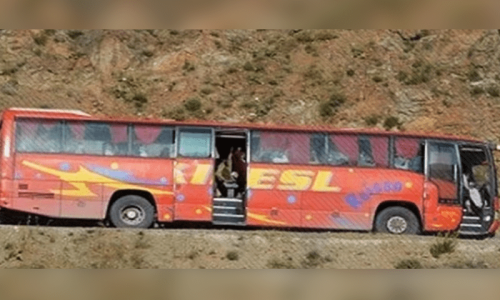PAKISTAN is undergoing the worst of catastrophes due to unprecedented monsoon rains and the ensuing floods. The exact losses and damage to crops, homes, livelihoods and animals cannot be ascertained at this stage as the devastation continues.
Natural disasters and calamities on their own are gender-neutral. They affect everyone. However, the humanitarian crises they cause impact the female population far more severely. UN Assistant Secretary-General Asako Okai recently said that when disaster strikes, women and children are 14 times more likely to die than men. According to UN Women, more than 70 per cent of women suffer various forms of gender-based discrimination in humanitarian crises.
Women and girls are more vulnerable than men and boys in times of calamity. Even more so when they are from the low- or no-income section of society. These women and girls are given least priority when it comes to rescue, relief and rehabilitation. Therefore, they are the most exposed to devastation.
When disaster abates and (so-called) rehabilitation begins, women are further pushed into poverty. Their workload increases, they have less access to basic healthcare services and education. They are given less preference in work and employment opportunities. More often than not, their wages are lower than their male counterparts’ and many more girls drop out from schools than boys. Last but not least, women and girls become vulnerable to greater sexual abuse, harassment and human trafficking under calamitous conditions.
Women and girls suffer most during natural calamities.
Women in agriculture suffer the most having completely lost their livelihoods. With no income and food scarcity, the levels of malnutrition in women and girls increases. Many World Bank reports are a testament to this fact. The majority of women farm workers have never banked their savings, if ever they had any.
In disaster situations, shelter, food and drinkable water are primary needs. Already malnourished women and girls are an easy prey for waterborne diseases caused by unhygienic conditions in camps and shelters.
Women in the rural areas already face reproductive health issues due to a dearth of even basic maternal healthcare facilities as well as trained qualified female doctors. When natural calamities strike, pregnancy and childbirth put women at great risk and increase their vulnerability especially if they are displaced, living in camps and tents which are far from the city centres and without healthcare facilities. The CARE Pakistan country director has said: “When disasters like this hit, we know from experience that it’s women, girls and other marginalised groups who face the biggest challenges including access to humanitarian assistance.”
Pregnant women have nowhere to give birth safely because floods have washed away their homes and health facilities. Their lives and the lives of their babies are jeopardised without proper maternal healthcare.
Moreover, the damage to roads and bridges severely compromises girls’ and women’s access to healthcare facilities, whilst simultaneously reducing access to gender-based violence prevention and response services. Medical and psychosocial support to the survivors of GBV is virtually non-existent during such times.
In such dire circumstances, it is imperative that women lawmakers and political representatives put aside their differences and come forward, along with other social activists, to support and facilitate the government and relief agencies in reaching out to the affected women. It is important not only to rescue them from the immediate danger, but also to ensure that women-friendly camps and shelters fulfil their basic needs and are equipped with toilets, health and hygiene kits, clothes, menstrual cloth/pads and nutrition supplements for expectant mothers. Priority should then be accorded to providing psychological and emotional support to women, who have been hit by the floods, have lost family members and suffered displacement.
There is a dire need for developing comprehensive gender-segregated data on devastation and the impact of natural disasters on women and girls. The issues and needs of women and girls, especially those that the government and relief organisations have missed, should be highlighted. Mainstream media and social media need to report on the situation of women and girls who have been displaced and are living in camps.
Despite experiencing several natural calamities, no government has come up with a concrete disaster preparedness plan for the future. Policies and plans should be based on lessons learnt. Disaster management plans and disaster-risk reduction plans should be developed, mainstreaming gender-responsive actions.
The needs of women and girls should be incorporated into rescue, relief and rehabilitation plans. Opportunities can be identified from the experience of the disaster to change traditional gender roles and improve women’s participation in rehabilitation and reconstruction initiatives.
The writer is a lawyer.
Published in Dawn, September 8th, 2022











































